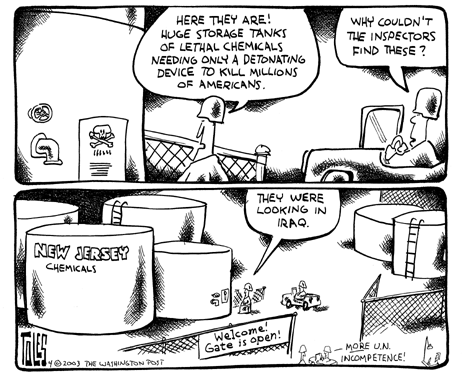Chemical Industry Steps Up To the Plate...And Strikes Out
The most effective weapon of mass destruction ever used in the United States was the commercial airliner, with the assistance of a few boxcutters. One way to effectively address that threat would have been to eliminate the source: ban airplanes from the skies. But that probably would have generated some public opposition, So the next best action was to heighten security at the gate (more guns, better inspections, etc.) so that no passenger has the means to hijack a plane.With chemical plants, however, where the "right" accident could kill many more people than died on 9/11, the situation is different. On one had we can't eliminate chemical plants. But on the other hand, we can (unlike air travel) eliminate much of that hazard at its source by replacing highly hazardous chemicals or processes with less hazardous chemicals or processes, or by storing smaller quantities of hazardous chemicals on site. These and other measures form the basis of what is known as "inherently safer" production. One advantage of this method is that it not only minimizes the effectiveness of any terrorist incident. A bigger advantage is that it also minimizes the existing day-to-day threat of catastrophic chemical plant accidents that may be caused by management system errors or equipment failure.
So it was rather disconcerting to read about a recent chemical plant security summit attended by the largest chemical manufacturers and associations.
Throughout the day, industry leaders agreed, conceding that many of their largest and most dangerous facilities still lack armed guards, perimeter fencing or even nighttime patrols.Note what is listed last (and probably least) It's not that the attendees don't understand the threat from terrorism. The problem is that they seem to ignore the fact that the hazardous chemicals and unsafe conditions at many of these plants present the same level of threat to U.S. citizens as exists after 9/11 and will continue to exist even if Al Qaeda and their brethren are eliminated. Accidents happen, and as long as the potential is there, we are all at risk. Bhopal, remember, was not a result of terrorism.
But they also insist they have upgraded protections for their workers and neighbors. Dozens of companies told about adding lights, barbed wire, hiring round-the-clock guards and, in a few instances, even substituting less-dangerous chemicals for toxic chemicals.(emphasis added)
An unprecedented national Chemical Security Summit in Philadelphia wrapped up Thursday, with federal counterterrorism experts and corporate executives insisting that, while much has been done to improve security, more must be done, quickly, to protect citizens from terrorists seeking to turn chemical tanks into the "poor man's atomic bomb."But nothing is likely to be done about the concept of inherently safer production if the American Chemical Council has its way:
"You've heard about sarin and other chemical weapons in the news. But it's far easier to attack a rail car full of toxic industrial chemicals than it is to compromise the security of a military base and obtain these materials," said FBI Special Agent Troy Morgan, a weapons-of-mass-destruction specialist who spoke at the summit.
Corporate and government leaders worry that terrorist cells could unleash toxins on a major American city -- a disaster that could rival the Bhopal, India, industrial accident that killed more than 20,000 in 1984.
The chief culprits stalling faster reforms, executives and federal counterterrorism experts agree, are a corporate culture that embraces slow, incremental changes rather than sweeping innovations, and an economic downturn that's left little cash for security.
The ACC represents the interests of the nation's largest chemical manufacturers on Capitol Hill. In October, it spearheaded a successful drive to crush the Chemical Security Act, a bill that would have federalized securing at nearly 13,000 sites nationwide. Key to the bill was a measure forcing major manufacturers to shift production to "inherently safer" materials and technologies. Without federal legislation, chemical security is being addressed by the new Department of Homeland Security.I've written previously here, here and here about the legislative battles -- Jon Corzine's bill (S. 157) which requires the chemical industry to consider inherently safer technologies vs. Senator James Inhofe's (D-OK) bill which pretty much leaves it up to voluntary efforts by the chemical industry, its slow corporate culture and the economic downturn.
Congress will soon be bringing up the issue again. Unfortunately, given who is in control and has the largest lobbying budget, the prospects for Corzine's bill are not good -- unless the public decides that eliminating the potential for a "poor man's atomic bomb" at the source will make them feel more secure than more armed guards and higher barbed-wire fences. And then making their opinions known to their Congressional representatives.
